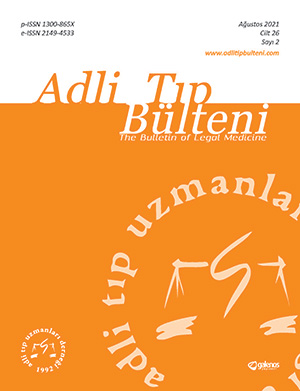Investigation of the Effects of Probation Practices on Restorative Justice System
DOI:
https://doi.org/10.17986/blm.1420Keywords:
restorative justice, probation, probationers, probation processAbstract
Objective: In this study, it was tried to determine disadvantages by means of investigating the effects of probationers’ life in the implementation of probation practices which is an element of restorative justice and it was aimed to find suggestions that will improve the practice.
Methods: Using the phenomenological analysis method, Questions were asked during in-depth interviews to eight probationers in different process of the probation and three experts were interviewed. To evaluate how they make sense of restorative justice and how they were affected by the probation process to participants.
Results: Due to experiences share the by participants, it has been determined that the probation processes can turn into a stigmatization system that prevents social compliance of the probationers and the measures are not determined according to probationers' risks and needs. Also, it violets the presumption of innocence in the perception of third parties at the trial stage and the function of deterrence from crime is not satisfactory.
Conclusion: It can be ensured that probation services serve more to restorative justice by methods such as ensuring social cohesion by taking into account the risks and needs of probationers, the probationer at the trial stage benefiting from the presumption of innocence, and individualizing the process. These suggestions will be possible with the improvements in this direction without the need for changes in the existing legislation.
References
McCold P. Restorative justice - variations on a theme. restorative justice for juveniles - potentialities. Risk and problems for research. Leuven: Leuven University Press; 1998.
Van Ness Daniel W, Strong Karen H. Restoring justice an introduction to restorative justice. USA: Anderson Publishing; 2015.
Johnstone G, Van Ness DW. The meaning of restorative justice. In: Johnstone G, Van Ness DW, editors. Handbook of Restorative Justice. London: Willon Publishing; 2011:5-23.
Akdeniz G. Onarıcı Adalet Yaklaşımı ve Kavramsal Temelleri. YÜHFD. 2019;1:1-23.
UNODC. Onarıcı adalet programları el kitabı. Karan U, redaktör. Lingua İletişim ve Turizm Tic. Ltd. İstanbul: CİSST; 2013.
Avrupa Konseyi Bakanlar Komitesinin Üye Devletlere Avrupa Konseyi Denetimli Serbestlik Kurallarına İlişkin CM/REC (2010) No’lu Tavsiye Kararı Erişim Tarihi: 05.05.2019. Erişim Adresi: http://www.cte.adalet.gov.tr/ menudekiler/uluslararasi/dsm_tavsiyekararlari/AB_DS_kurallari_turkce.pdf
Yavuz H. Ceza İnfaz Sistemi ve Denetimli Serbestlik, Ankara: Seçkin Yayıncılık, 2018.
Whitehead JT, Braswell MC. The future of probation: reintroducing the spiritual dimension into correctional practice. Georgia State University Criminal Justic Review. 2000;25(2):207-233.
Apaydın C, Kaplan H. Ceza infaz sistemi ve denetimli serbestlik. İstanbul Aydın Üniversitesi Hukuk Fakültesi Dergisi. 2019;5(2):185-207.
Demirbaş T. İnfaz hukuku. Seçkin Yayıncılık: Ankara, 2017.
Özgüven DA. Ceza muhakemesi kanunu çerçevesinde “adli kontrol”. TBB Dergisi. 2009;2009:81.
5271 sayılı Ceza Muhakemesi Kanunu, 109. madde gerekçesi Erişim Adresi: www.corpus.com.tr
Denetimli Serbestlik Daire Başkanlığı, İstatistikler. Erişim Tarihi: 30.05.2020 Erişim Adresi: http://www.cte-ds.adalet.gov.tr/.
Patton MQ. Nitel araştırma ve değerlendirme yöntemleri. Pegem Akademi: Ankara, 2018.
Neuman LW, Toplumsal araştırma yöntemleri nitel ve nicel yaklaşımlar. Yayın Odası Yayınları: İstanbul, 2009.
Turhan F, Altıkat A, Yeni bir ceza infaz usulü olarak denetimli serbestlik ve bu usulden yararlanma şartları. Süleyman Demirel Üniversitesi Hukuk Fakültesi Dergisi. 2012;2(2):1-46.
Carr N, Maguire N. Pre-sentece reports and indivudalised jusitce: consistency, temporality and contingency. Irish Probat J. 2017;14:52-71.
Müftüoğlu D. Denetimli serbestlik sürecindeki hükümlülerin uyumsal süreçlerinin incelenmesi, yayımlanmamış yüksek lisans tezi. Maltepe Üniversitesi, İstanbul, 2019.
Dowden C, Andrews D. The importance of staff practice in delivering correctional treatment: a meta-analysis. Int J Offender Ther Comp Criminol. 2004;48:203-214.
Holt P. Case management: shaping practice. In: Ward D, Scott J, Lacey M, editors. Probation working for justice. 2nd ed. Oxford: Oxford University Press, 2002;257-275.
Schneider A, McKim W. Stigmatization among probationers. J Offender Rehabil. 2003;38(1):19-31.
Aydoğan R. Cezaevi sonrası denetimli serbestlik sürecindeki hükümlülerin suç, damga ve sosyal dışlanma bağlamında incelenmesi, Yayımlanmamış yüksek lisans tezi, Mimar Sinan Güzel Sanatlar Üniversitesi, İstanbul, 2018.
Çınar A. Denetimli serbestlik sistemindeki rehabilitasyon hizmetlerinin hükümlülerin yeniden sosyalizasyonu sürecine etkileri: Aydın örneği, Adnan Menderes Üniversitesi, Aydın, 2015.
Fidan D. N., Denetimli serbestlik sisteminin toplumsal uyum sürecine etkisi: Bolu örneği, yayımlanmamış yüksek lisans tezi, Abant İzzet Baysal Üniversitesi, Bolu, 2016.
Downloads
Published
Issue
Section
License
Copyright (c) 2021 The Bulletin of Legal Medicine

This work is licensed under a Creative Commons Attribution 4.0 International License.
The Journal and content of this website is licensed under the terms of the Creative Commons Attribution (CC BY) License. The Creative Commons Attribution License (CC BY) allows users to copy, distribute and transmit an article, adapt the article and make commercial use of the article. The CC BY license permits commercial and non-commercial re-use of an open access article, as long as the author is properly attributed.

